How Price Comparison Can Transform Your Business Strategy
Learn how price comparison tools can help your business strategy. Find the best deals, compare prices, and stay ahead of the competition.
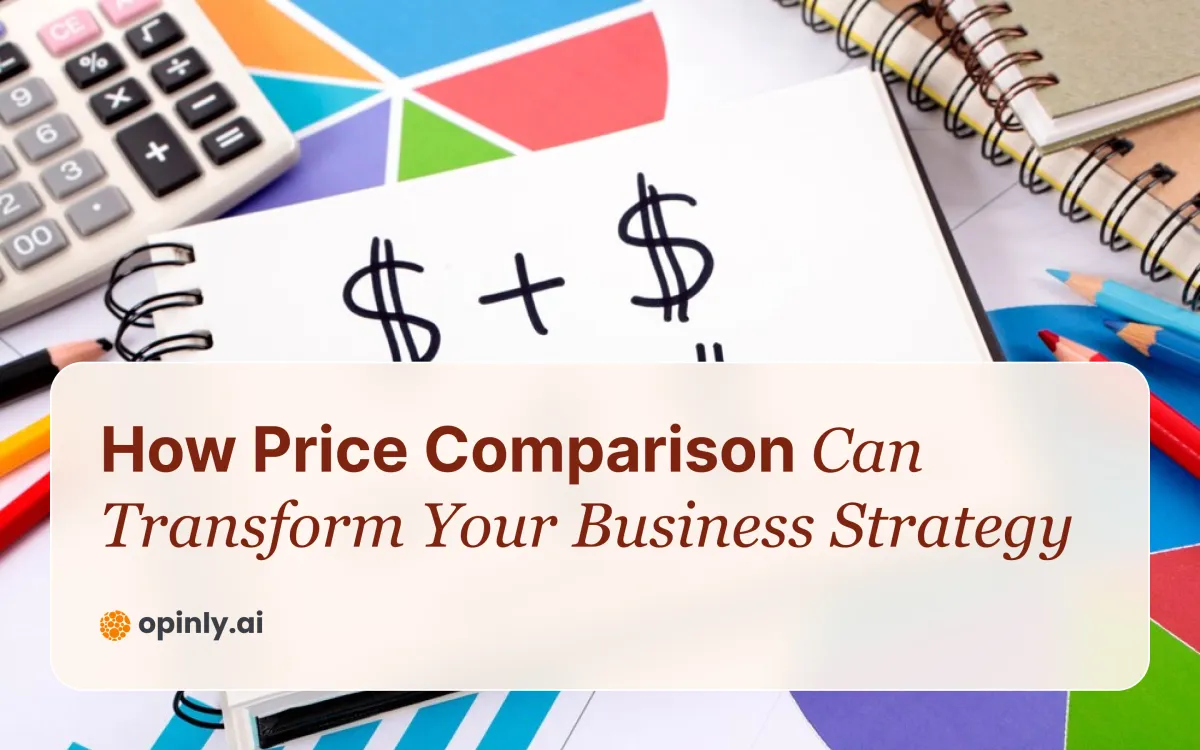
Did you know that businesses using price comparison tools can increase their profit margins by up to 20%?
In today's competitive market, knowing where your prices stand can make a huge difference.
This article will explore how price comparison can transform your business strategy, helping you save money, gain a competitive edge, and satisfy your customers.
We'll discuss what price comparison is and why it's important, share real-life examples of successful businesses, and provide practical tips on how you can implement and benefit from price comparison in your own business.
Definition of Price Comparison
Price comparison is the process of looking at the prices of the same product or service from different sellers to find the best deal. It involves checking how much something costs in various stores or online platforms to ensure you are getting the best value for your money.
You can do this manually by visiting different websites or stores and noting the prices, or you can use special tools and websites that automatically gather and show the prices from multiple sources. This helps you make smart buying decisions and save money.
Why is Price Comparison Important?

Price comparison is important because it helps you find the best and most affordable price for what you want to buy.
By comparing prices, you can make sure you're not overpaying and are getting the best value for your money, which can lead to significant savings.
There are two main ways to compare prices. First, you can manually visit different stores or websites and write down the prices to see which one offers the best deal. Second, you can use special websites and apps that collect price information from various sources and display it for you in one place, making it easier to compare.
How Do Consumers Benefit from Best Price Comparison?

Price comparison is a great tool for consumers because it helps ensure you’re not paying too much for something.
By comparing prices, you can find the best deals and make smart decisions, whether you're shopping for groceries, buying electronics, or booking travel services.
Here are some ways consumers benefit from price comparison:
- Finding the best price for what you want to buy can help you save money. Over time, these savings can really add up, particularly when you're purchasing expensive items. For example, if you're buying a new refrigerator, comparing prices at different stores could save you hundreds of dollars. This kind of smart shopping means more money in your pocket in the long run.
2. Comparing prices lets you find the best deals and discounts that you might have missed otherwise, helping you get more for your money. For instance, if you're looking for a new pair of sneakers, checking several stores and websites could lead you to a great sale or a special coupon code that lowers the cost significantly. This way, you spend less while still getting the shoes you want.
3. Knowing prices from different sellers helps you make smart choices when buying things. This way, you can pick the best option based on both the cost and the quality of the item. For example, if you're shopping for a coffee maker, comparing prices and reading reviews from various stores can guide you to a model that not only fits your budget but also has the best features and durability for the price. This approach ensures you get the most value for your money.
4. By looking at prices from several different places, you can make sure you're not paying too much for something. This helps you always get a fair price. For example, if you're buying a new smartphone, checking prices at different stores and online can show you where it's being sold for less. This way, you avoid paying a higher price than you need to, saving money that you can use elsewhere.
5. Many tools and websites for comparing prices make it easy and fast to check different prices. This saves you time and effort because you don't have to go to several stores or websites yourself. For example, if you're looking to buy a new book, using a price comparison website lets you see prices from various online bookstores in one place. This way, you can quickly find the best deal without having to check each website individually.
6. When you know item prices beforehand, planning your budget becomes easier. This way, you can decide what to buy based on what you can afford. For example, if you're planning to buy new kitchen appliances, checking prices online first lets you figure out how much you can spend on each item without overspending. This helps you manage your money better and ensures you only buy what fits within your budget.
7. Comparing prices before you buy gives you peace of mind because you know you're getting the best deal available. This makes you feel more confident about your shopping choices. For example, if you're buying a new TV, checking prices from different retailers can help you find the lowest price for the model you want. Knowing you've gotten the best deal possible can make you feel good about your purchase, knowing you've spent your money wisely.
8. Comparing prices can also lead you to discover new stores or brands that might offer better deals than your usual shopping spots. For instance, if you're shopping for running shoes and decide to check prices across different retailers, you might find a new store offering a high-quality pair at a lower price than the big-name brands you typically visit. This not only saves you money but also introduces you to new shopping options that could have better prices in the future.
How Do Businesses Benefit from Price Comparison Site Alert?

For businesses, using price comparison site alerts is more than just about finding good deals. It’s a powerful tool for understanding the market. Here are some ways businesses benefit from these alerts:
1. Monitor Competitors
Keeping track of competitors' prices is crucial for businesses, and price comparison alerts make this task easier. These alerts notify a business when their competitors change their prices or offer special promotions.
For example, if a competing coffee shop drops its prices or starts a "buy one, get one free" deal, a nearby café can quickly find out through these alerts. This helps them respond effectively, either by adjusting their own prices or by offering their own promotions to attract customers.
2. Spot Market Trends
Regularly checking price alerts helps businesses identify trends in the market. This means they can see if the prices for certain products are generally rising or falling.
For instance, if a clothing store notices through price alerts that the cost of cotton t-shirts is dropping across the industry, it suggests a trend of decreasing prices. This information can help the store decide whether to lower their prices to stay competitive or possibly stock up on cheaper inventory while costs are low.
3. Identify Opportunities
Businesses can use price alerts to spot opportunities to attract more customers by offering better deals or introducing new products. For example, if a business notices through these alerts that competitors are charging high prices for a specific type of product, like organic fruit, the business might decide to lower their prices on these items.
This lower price could draw customers away from competitors and boost sales. Additionally, if they see a gap in what competitors are offering, they might also consider introducing a new product to fill that niche.
4. Adjust Pricing Strategies
Having current information on what competitors are charging allows businesses to tweak their pricing strategies to stay competitive. For example, if a business finds out that a competitor has reduced the price of a similar product, they might decide to lower their own prices to match.
This helps them remain attractive to customers who are comparing options. Alternatively, if a business doesn't want to lower prices, they might focus on emphasizing the superior quality or additional features of their products to justify a higher price. This approach helps customers see the extra value they get for paying a bit more.
5. Make Smart Decisions
Having access to up-to-date pricing information allows businesses to make smart, informed decisions based on data. This means they can strategically choose the best times to adjust their prices, launch promotions, or introduce new products, all based on what's currently happening in the market.
For example, if a business sees that many competitors are starting to offer discounts on summer clothing as the season changes, they might decide to do the same to stay competitive. This kind of data-driven decision-making helps businesses stay relevant and attractive to customers.
6. Improve Customer Satisfaction
By keeping their prices competitive, businesses can increase customer satisfaction and loyalty. When customers feel that they're getting good value for their money, they're more likely to continue shopping with the same business.
For example, if a bookstore regularly adjusts its prices to match or beat the prices of online retailers, customers will appreciate getting a good deal. This makes them more likely to return to the bookstore in the future instead of looking elsewhere, thereby improving customer loyalty and satisfaction.
7. Increase Profit Margins
Businesses can use price alerts to fine-tune their profit margins. This means they can find just the right price that keeps them competitive but also ensures they make a good profit.
For example, if a coffee shop finds out through price alerts that competitors are selling lattes for $4, but they have been charging $5, they might decide to lower the price to $4.50. This small reduction can attract more customers while still keeping a healthy profit margin, balancing the need to be competitive with the goal of making a profit.
8. Enhance Marketing Strategies
Understanding competitor pricing can greatly enhance a business's marketing strategies. By knowing the prices set by others, a business can position its products as either more affordable or as offering better value.
For example, if a smartphone retailer notices that their competitors are selling similar models at higher prices, they can advertise their phones as the more cost-effective choice. This not only attracts price-conscious consumers but also strengthens the retailer’s reputation for offering great value, helping to draw in more customers and increase sales.
9. Stay Ahead of the Competition
Regularly using price comparison alerts keeps businesses informed about what's happening in the market. This helps them stay one step ahead of their competitors.
For example, if a bakery sees that a nearby bakery has started offering a popular new pastry at a lower price, they can quickly adjust their own prices or introduce a special deal. By staying updated on competitor actions, they can make timely decisions to attract more customers and maintain their competitive edge.
10. Reduce the Risk of Overpricing or Underpricing
Price alerts help businesses avoid the mistakes of overpricing and underpricing. If prices are too high, customers might go elsewhere, and if prices are too low, the business might not make enough profit.
For example, if a toy store uses price alerts and sees that other stores are selling a popular toy for $20, they can set their price around the same amount. This way, they don’t scare away customers with a high price or lose money by setting it too low.
5 Best Price Comparison Websites
Finding the best price for your purchases is easier with price comparison websites. Here are five of the best options, including Opinly AI, and the benefits they offer:
1. Opinly AI
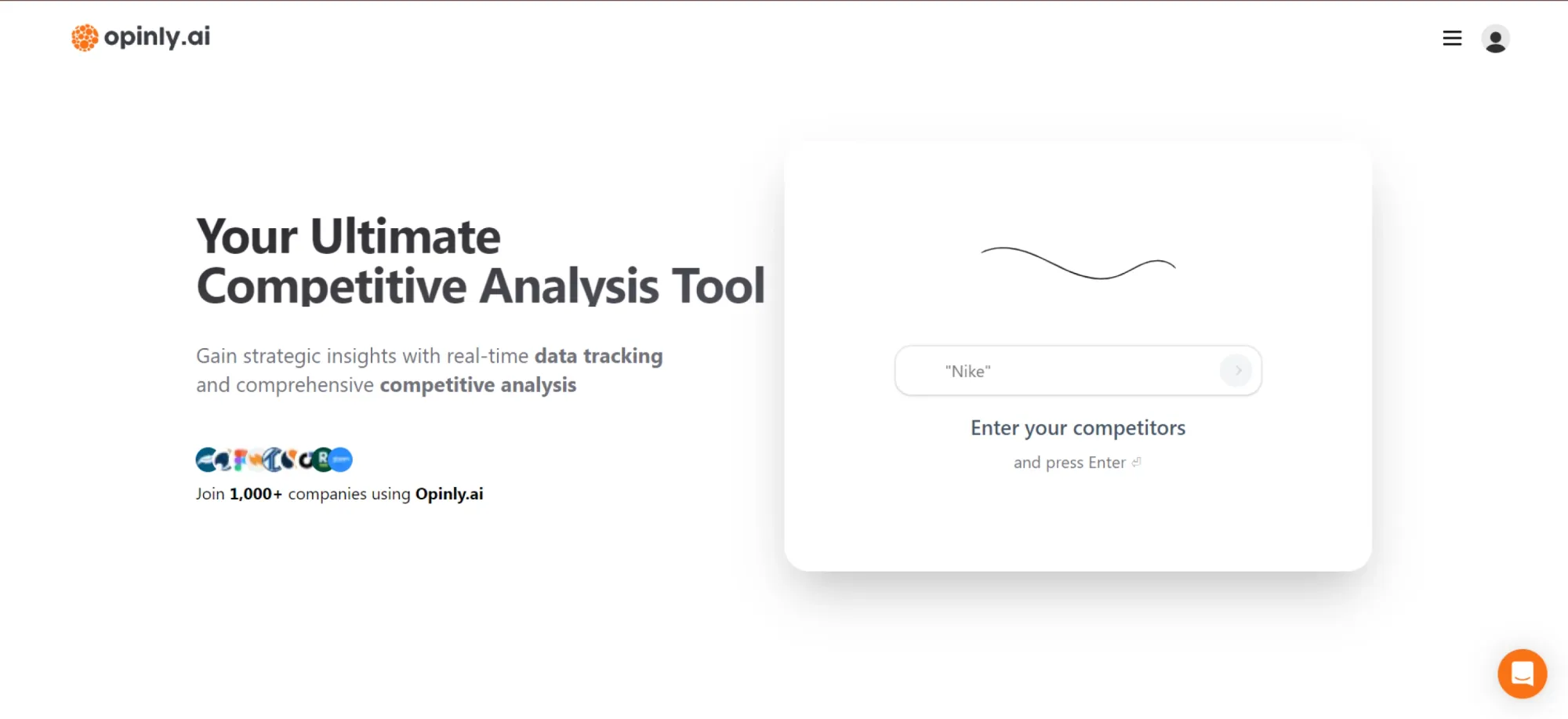
Opinly AI is a powerful price comparison tool that helps businesses and consumers track competitors' prices in real-time, enabling them to stay competitive and make informed purchasing decisions.
Pros:
- Advanced Price Tracking: Opinly AI provides real-time updates on competitors' prices, ensuring you always have the latest information.
- Custom Alerts: Set personalized alerts for specific products, so you're notified when prices drop.
- Comprehensive Data: Get detailed reports and insights to help you make informed decisions.
2. Google Shopping
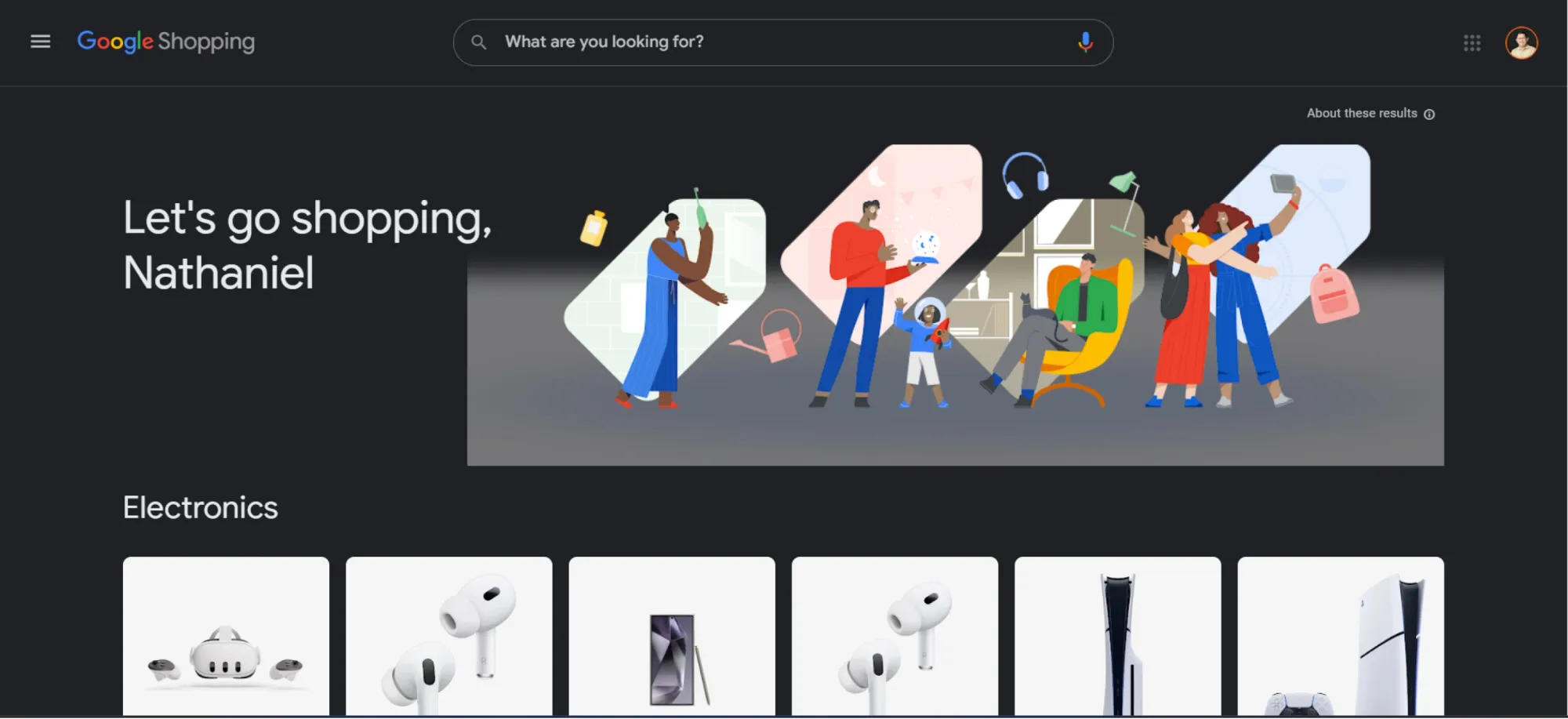
Google Shopping is a price comparison service that allows users to search for and compare prices on a wide range of products from various online retailers.
Pros:
- Wide Range of Products: Google Shopping covers a vast array of items, making it easy to compare prices across many categories.
- User Reviews: Read customer reviews to help decide which product is best for you.
- Easy to Use: Simple interface for quick and easy price comparisons.
3. PriceGrabber
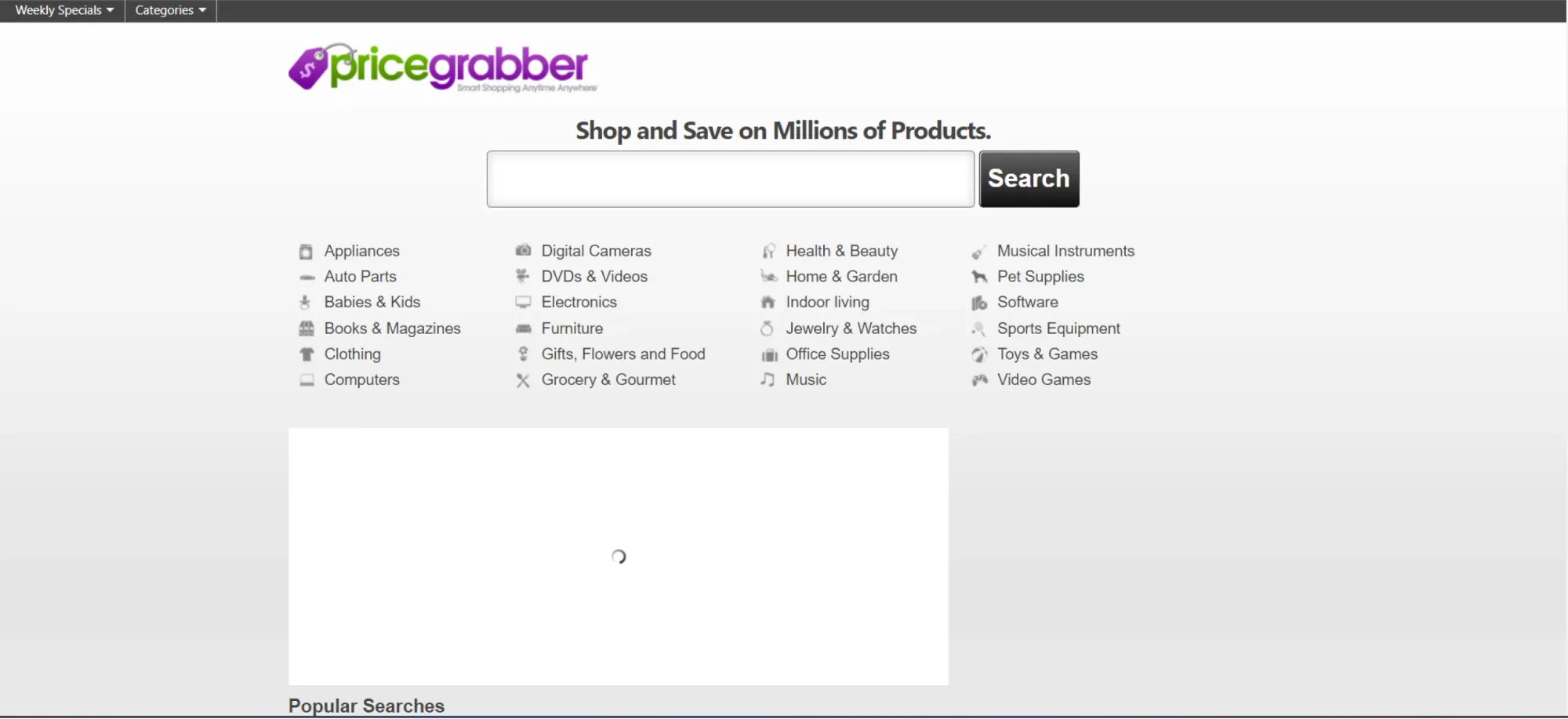
PriceGrabber is an online price comparison service that allows users to compare prices, features, and reviews on a wide range of products from different retailers.
Pros:
- Detailed Product Information: PriceGrabber offers in-depth details about products to help you compare more than just prices.
- Email Alerts: Receive notifications when the price of an item you're interested in changes.
- User-Friendly: Easy navigation and search functions.
4. Shopzilla
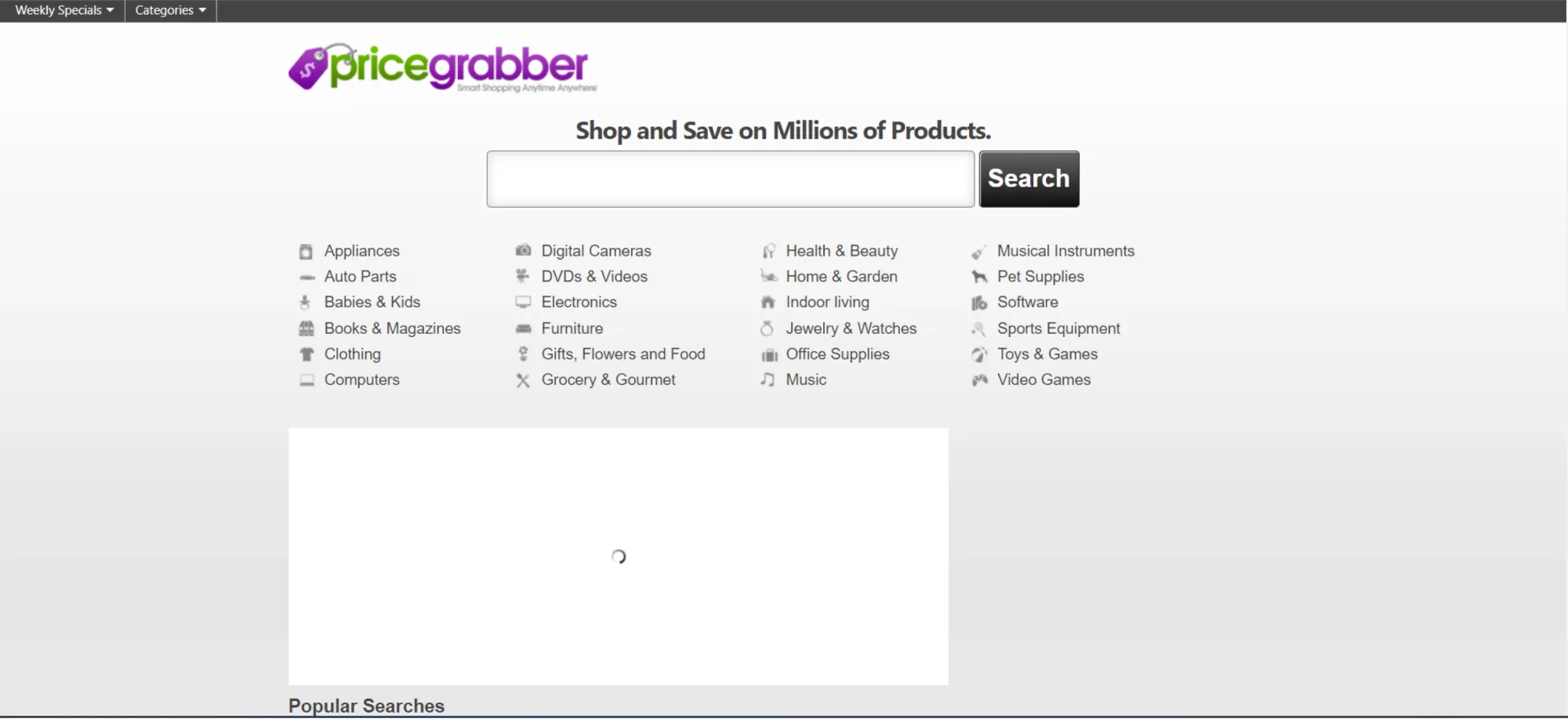
Shopzilla is a price comparison website that enables users to compare prices, read product reviews, and find deals from a large number of online retailers.
Pros:
- Extensive Listings: Shopzilla lists products from a large number of retailers, providing a broad view of available options.
- Product Reviews: Access reviews and ratings from other shoppers to guide your choices.
- Price Alerts: Set alerts to be notified when prices drop.
5. PriceRunner

PriceRunner is a price comparison website that allows users to compare prices on products from both online and offline stores, helping them find the best deals available.
Pros:
- Comprehensive Coverage: PriceRunner covers both online and offline stores, giving you a complete picture of available deals.
- Price History: View the price history of a product to see if you're getting a good deal.
- Daily Deals: Discover special daily deals and promotions.
Conclusion
Using price comparison in your business strategy can give you a big advantage. By using tools like Opinly AI and other price comparison websites, you can keep track of market trends and what your competitors are charging.
This helps you set the right prices, making sure you stay competitive while still making a profit. It also keeps your customers happy because they feel they’re getting a good deal. With the information from price comparisons, you can make smart decisions, find new opportunities, and create better marketing plans.
Overall, staying on top of prices helps you boost sales, keep customers loyal, and grow your business.
Frequently Asked Questions
1. What is the meaning of price comparison?
Price comparison means checking the prices of the same product at different stores or websites to find the best deal. It helps you see where you can buy the item for the lowest price.
2. How do you do a price comparison?
To do a price comparison, you can use price comparison websites or tools. These websites show you the prices of a product from different stores. Simply type in the product name, and you’ll see a list of prices from various retailers. You can also compare prices manually by visiting different stores’ websites or physical locations and noting the prices.
3. What is comparative price?
Comparative price is the price of a product compared to the prices of similar products or the same product at other stores. It helps you understand if you're getting a good deal or if you can find a better price elsewhere.
4. What is the best price comparison website?
There are several great price comparison websites, but some of the best include:
- Opinly AI: Provides real-time updates and custom alerts on competitors' prices.
- Google Shopping: Covers a wide range of products and includes user reviews.
- PriceGrabber: Offers detailed product information and email alerts.
- Shopzilla: Lists products from many retailers and provides product reviews.
- PriceRunner: Covers both online and offline stores and shows price history.
